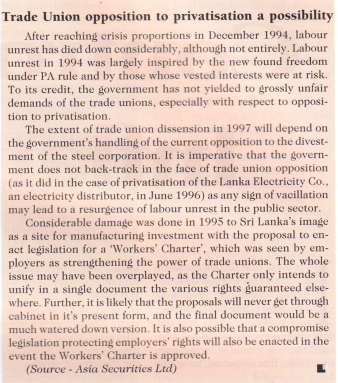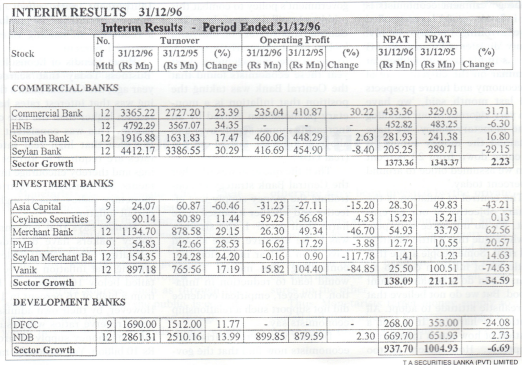It was a point in time to realise that all those rumblings and mumblings about the government not having a ‘clear cut economic policy’ would be to no avail.
The time has come to pull up one’s socks and put the proverbial nose to the grind within the given economic parameters.
The majority of the voters in Sri Lanka have registered their confidence in the governance of the alliance and no matter what the middle class urban populace has to say, a democratic statement has been made.
Stock market indices, bear runs, rupee devaluation or liquidity in the money market did not seem to have any effect on the majority of voters. It was definitely clear that these worries were confined to the airconditioned chambers of the urban voter.
Be that as it may, the stock broking community has been making some positive sounds about the Sri Lankan economy, from the beginning of this year. Asia Securities Research Report for December 1996 reads ‘Sri Lanka – Poised for revival’; CTC Stock Brokers in their Earnings Guide 1997… the market will recover in 1997…… will reach 800 levels by end 1997′; Jardine Fleming/Research is titled ‘Sri Lanka Strategy 1997-A ray of hope.
Jardine Fleming/Research, (the latest edition) also says that the market may not get cheaper. We believe that the worst is over for the Sri Lankan market. Benefits from a gradual improvement in the economy will lead to an earnings recovery in 1997. As in the economy we feel that the corporate earnings cycles have seen the bottom in 1995 and 1996. While most negatives are discounted at current levels growing confidence on the economy and company earnings are not reflected in the market valuations. Therefore downside from current levels is limited. We attribute political and military related worries as reasons that will restrict an upswing in 1H CY97. The advent of local elections, the government’s will to finalise devolution proposals in 1 and expected military operations against the LTTE will negate the impact from positive news. Hence, the market is set to trade in a narrow band in the next three months. For those who take a long-term view current valuations offer excellent opportunities in fundamentally sound stocks.”
A ray of hope indeed and it is firmly the view of the stock broking community that the prolonged bear market is in its final stages.
Asia Securities in their December report stated that ‘after false starts, the government is finally getting a grip on economic management with a focus on reducing the fiscal deficit. Expensive subsidies have been cut and emphasis has been placed on economic growth by incentivising investment in real assets. Further, military expenditure is expected to at least level off, if not fall, after rocketing in 1995 and 1996 as substantial hardware purchases have already been made. The fiscal deficit, that the government expects to record 8.7 percent of GDP in 1996 is projected to improve through to the end of the decade. The government’s target is to reduce the deficit to 4.5 percent of GDP by 1999. The deficit was largely inflated in 1996 by defence spending which was 6 percent of GDP.”

Asia Securities report further states although some confusing economic policy signals and implementational problems were seen in the early part of the Peoples’ Alliance (PA) administration, liberal reforms of the economy are. continuing and private sector led growth is encouraged. The basic thrust in economic policy has not changed from that of the United National Party (UNP), the architects of Sri Lanka’s free-market economic system.
“The effective prosecution of the north-eastern war has relegated the LTTE to a jungle based guerrilla outfit. Tight security in Colombo has also prevented recent LTTE attacks in the city, leading to relative stability. Government forces have launched a campaign to win the hearts and minds of the Northern Tamil populace and isolate the LTTE. This is a prelude to forcing the LTTE into negotiations.
The privatisation of politically sensitive state organisations such as telecom, plantations and utilities is proceeding despite some trade union opposition. Privatisation of these ventures would have been difficult for the former UNP government given its strained relations with the labour movement.
‘Several high profile presidential visits to Japan, South Korea, China and France have set the stage for a revival of foreign direct investment. The privatisation of the Steel Corporation was a direct result of the visit to Korea, whereby Hanjung Steel purchased a 90 percent stake.”
Asia Securities also says that the lack of market liquidity which has been a deterrent to increased foreign participation in the market, will ease with key privatisation in 1997 and 1998. The government has made considerable headway in privatising the larger state owned institutions such as plantations, Sri Lanka Telecom, Airlanka and Steel Corporation. They are of the opinion that the electricity authority and the insurance and banking giants will be privatised by the end of the decade.



